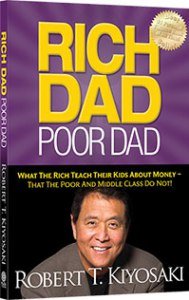♥ the best book for me <rich dad poor dad> ♥

Welcome to Passive Real Estate Investing. I’m your host, Marco Santarelli. On this episode, I want to talk about a very famous book, Rich Dad Poor Dad. I want to make a book summary here. If you’ve read the book, even if you’ve read the book more than once or you’re familiar with the book, I still suggest listening to this episode because we learn through repetition. You might catch a lot of things in your first run-through with the book but it’s not until you listen to something or read something a second or third time that you catch things you missed the first time, and you catch some new ideas that connect and gelled with new knowledge that you have in your head. It’s always good to hear things a second or third time, because often you’ll catch new ideas and see things in a new perspective.
PREI071 | Rich Dad Poor Dad
Rich Dad Poor Dad: What The Rich Teach Their Kids About Money That the Poor and Middle Class Do Not!
Rich Dad Poor Dad was a book that really affected me and opened my eyes because when I was reading that book, I literally cannot put it down. I was just so drawn into it. I was on a train ride from Rome to Florence, Italy at the time. With this beautiful countryside whizzing by on both sides of the train, it was more important to me to read the Rich Dad Poor Dad book than it was to look out the window of the train and admire and take in the beautiful scenery. I was focused.
The nice thing about Rich Dad Poor Dad is that the book summarizes Robert Kiyosaki’s lessons learned from two different perspectives, that of a poor man and that of a rich man. Drawing on his own experiences, Robert Kiyosaki discusses how he creates financial independence through investing and property ownership and building businesses. In his book, he says, “Look around, the richest people didn’t get rich because of their education. You look at Michael Jordan or Madonna, even Bill Gates who dropped out of Harvard and founded Microsoft, he’s now the richest man in America and he’s still in his 30’s.” That was back then, keep in mind this was twenty years ago. The point he’s trying to make is that, getting a good education and making good grades no longer ensures you success. Nobody seems to have noticed this.
He talks about two perspectives, and they’re very subtle but they’re two different perspectives. He says one is, “The love of money is the root of all evil,” but then he also says, “The lack of money is the root of all evil.” I tend to believe the latter. I come from the camp that a lack of money is the root of all evil because if you have enough money, cash, then you can resolve your issues and you can be charitable and help other people with their issues. I think if you have that lack mentality, it’s really more of a poor and middle class type of perspective. It’s not a perspective of abundance.
One of the reasons the rich get richer, the poor get poorer, and the middle class struggles in debt is because the subject of money is taught at home, not in school. Most of us learn about money from our parents. What can a poor parent tell their child about money? Money is not taught in schools, unfortunately. Schools focus on scholastics and professional skills, but not on financial skills. This is very true to this day. It has been for actually a long time. Our staggering national debt is due in large part to highly educated politicians and government officials making these financial decisions with really no training or very little training on the subject of money.
This is refreshing to see business people in politics because politicians have effectively become career politicians, which I really don’t like. I think term limits are critically important. Robert Kiyosaki talks about looking at things from two different perspectives. Here’s an example. Some people say, “I can’t afford it,” versus saying, “How can I afford it?” That mental shift changes a lot. Now, you’re no longer focusing on why you can’t afford it. You begin to focus on how can you afford it.
Another perspective is, “Study hard so you can find a good company to work for,” versus, “Study hard so you can find a good company to buy.” One is an employee mentality, and one is an investment or business mentality. Another perspective is, “When it comes to money play it safe, don’t take risks,” versus, “Learn to manage risks.” Again, one is the mentality of a defensive investor and another is the mentality of someone who is a truly educated investor that manages risk through knowledge, through their financial IQ.

Money is one form of power, but what is more powerful is financial education. Money comes and goes, but if you have the education about how money works, you gain power over it and you begin to build wealth. Robert talks about different lessons. He goes through different chapters in his book. One of them in particular, this is where he starts, is the first lesson which is, “The rich don’t work for money.” I tell people this all the time, including my nine-year old daughter. Robert says if you want to be rich, you have to learn to make money, so use your head. When you fail, you’re only poor if you give up. The most important thing is that you did something. Most people only talk and dream about getting rich, but being able to know when to make quick decisions is a very important skill.
If you learn life’s lessons, and you will one way or another, if you learn life’s lessons, you will do well. If not life will just continue to push you around. People do two things. Some just let life push them around. Others get angry and push back. But they push back against their boss or their job, or their husband or wife. They don’t know it’s life that’s actually pushing them. If you realize that you’re the problem, then you can change yourself. You can learn something new and you can grow wiser. Most people want everyone else in the world to change but themselves. Let me tell you, it’s easier to change yourself than it is to change everyone else.
Lesson number one, he talks about the poor and the middle class work for money, the rich have money work for them. What this means is that true learning takes energy, passion, a burning desire. Anger is a big part of that formula, for passion is anger and love combined. When it comes to money, most people want to play it safe and feel secure. Passion does not direct them, fear does. Most people, given more money, only get into more debt simply because it’s easier to learn to work for money, especially if fear is your primary emotion when the subject of money is discussed. Just know that it is fear that keeps most people working at a job, the fear of not paying their bills, the fear of being fired, the fear of not having enough money, the fear of starting over. That’s the price of studying to learn a profession or trade, and then working for money. Most people become a slave to money and then get angry at their boss.
Most people have a price. They have a price because of human emotions named fear and greed. First, the fear of being without money motivates us to work hard, and then once we get to that pay check, greed or desire starts us thinking about all the wonderful things money can buy. The pattern is then set. The pattern to get up, go to work, pay bills, get up, go to work, pay bills, that’s the pattern that’s established. Their lives are then run forever by these two emotions of fear and greed. Offer them more money, and they’ll continue the cycle by also increasing their spending, and usually this is consumer spending, this is what we refer to as the rat race.
People also work for money because of desire. They desire money for the joy they think it will buy. The joy that money brings is often short lived, and they soon need more money for more joy. This sounds like a crack addict. More pleasure, more comfort and more security doesn’t necessarily lead to more freedom. They keep working, thinking money will soothe their soul that is troubled by fear and desire, but money can’t do that.
The sooner you forget about needing a pay check, the easier your adult life will be. Keep using your brain, work for free and soon your mind will show you ways of making more money far beyond what you could ever get paid. You will see things that other people never see, opportunities right in front of your nose. Most people never see these opportunities because they’re looking for money and security, so that’s all they get. The moment you see one opportunity, you will see them for the rest of your life. This is just something that comes with time and practice and focus on the fact that you should be not working for money, at least not in the beginning, but at least building up enough capital to start having that capital work for you, and that’s the difference.
In lesson number two, Robert talks about why we should teach financial literacy. It is a question, why teach financial literacy? Most people fail to realize that in life, it’s not how much money you make it’s how much money you keep. When people ask, “Where do I get started?” or, “Tell me how to get rich quick.” The only answer is, if you want to be rich, you need to be financially literate. Now, accounting is possibly the most boring subject in the world. It also could be the most confusing, but if you want to be rich long term, it could be the most important subject. Now the question is, how do you take a boring and confusing subject and teach it to your kids? The answer is, make it simple. Teach it first in pictures.

Rule number one is you must know the difference between an asset and a liability, and buy assets. If you want to be rich, this is all you need to know. It is rule number one. It is the only rule. Rich people acquire assets, the poor and middle class acquire liabilities, but they think they’re assets. You might hear some people say, “You mean, all we need to know is what an asset is and acquire them, we’ll be rich?” What defines an asset is not words but numbers. If you cannot read numbers, you cannot tell an asset from a hole in the ground. In accounting, it’s not the numbers but what the numbers are telling you. It’s just like words. It’s not the words but the story the story the words are telling you.
Here’s how to tell the difference between an asset and a liability. An asset is something that puts money in your pocket. A liability is something that takes money out of your pocket. This is really all you need to know. If you want to be rich, simply spend your life buying assets. If you wanted to be poor or middle class, spend your life buying liabilities. It’s not knowing the difference that causes most of the financial struggle in the real world. There is a flaw in the thinking of so many people. The flaw is that money will solve all problems. More money will often not solve the problem. In fact, it may actually accelerate the problem.
Money only accentuates the cashflow pattern running in your head. If your pattern is to spend everything you get, most likely an increase in cash will just result in an increase in spending. This is what happens with a lot of famous people, professional athletes and some movie stars. They make more and they spend more, and then they start spending more and more and more, and that pattern continuous for a long time. They get to a point where they’ve outspent their massive income.
Because students leave school without financial skills, millions of educated people pursue their profession successfully, but later find themselves struggling financially. They work harder but don’t get ahead. What’s missing from their education is not how to make money, but how to spend money, what to do after you make it. The question is, is a house an asset or liability? It’s amazing how people still to this day answer this question by saying it’s an asset. When it comes to houses, I point out that most people work all their lives paying for a home they never own. In other words, most people buy a new house every seven years, I think that’s been the national average, and each time incurring a new 30-year loan to pay off the previous one. Even though people receive a tax deduction for that interest on the mortgage payments, they pay for all their other expenses with after-tax dollars, even after they pay off their mortgage.
The greatest loses of all are those from missed opportunities. If all your money is tied up in your house, you may be forced to work harder because your money continues blowing out of those expense columns on your profit and loss statement. Instead of adding to the asset column, you’re spending after-tax dollars on all the expenses related to your home and your furniture and your cars. This is the classic middle class cashflow pattern. Income comes in on the income side of your profit and loss sheet or your income in expense sheet, and then goes straight out the expense side.
The end result in making a decision to own a house that is too expensive in lieu of starting an investment portfolio early on impacts people in at least the following three ways. First, loss of time, during which other assets could have grown in value. Second, a lack of additional capital which could have been invested instead of paying for high maintenance expenses related directly to the house. Third, loss of education. Too often, people count their house, savings and retirement plans as all they have in their asset column because they don’t have money to invest. They simply do not invest.

The third lesson is mind your own business. Most people work for everyone else but themselves. They work first for the owners of the company, then for the government through taxes, and finally for the bank that owns their mortgage. Secret number three of the rich is mind your own business. Financial struggle is often directly the result of people working all their life for someone else. Many people will have nothing at the end of their working days. Think of this, most people think that their profession delivers their income, but the rich people think that their assets delivers their income.
Let’s look at the education system. Our current educational system focuses on preparing today’s youth to get good jobs by developing scholastic skills. They study to become engineers, scientists, cooks, police officers, artists, writers and so on. These professional skills allow them to enter the workforce and work for money. There’s a big difference between your profession and your business. When you ask people, “What is your business?” They will say, “I’m a banker,” then I ask them if they own the bank, and they usually respond, “No, I work there.”
The problem with school is that they often become what you study. If you study cooking, you become a chef. If you study the law, you become an attorney. If you study auto mechanics, that makes you a mechanic. The mistake of becoming what you study is that too many people forget to mind their own business. They spend their lives minding someone else’s business and making that person rich. You need to mind your own business. To become financially secure, a person needs to mind their own business. Your business revolves around your asset column as opposed to your income column. This is a key distinction, because the rich focus on their asset columns while everyone else focuses on their income statements.
Start minding your own business. Keep your day job, but start buying real assets, not liabilities or personal effects that have no real value once you get home with them. A new car loses nearly 25% of the price you pay for it the moment you drive it off the lot. It is not a true asset, even if your banker lets you list it as one. For young people who have not left home, it is important for parents to teach them the difference between an asset and a liability. Get them to start building an asset column before they leave home. Get married, buy a house, have kids, and get stuck in a risky financial position, clinging to a job and buying everything on credit.
Real assets fall into several different categories. Businesses that don’t require your presence. You own them but they are managed or run by other people. If you have to work there, it’s not a business, it becomes your job. Second, are stocks. I’m not a big fan of stocks but it is an asset. Bonds, mutual funds, income generating real estate, absolutely my favorite, notes, which are simply IOUs, royalties from intellectual properties such as, music, scripts, patents and whatnot. If you want to get an idea of that just watch Shark Tank on TV. And anything else that has value, produces income or appreciates and has a ready market. Those would be real assets.
The fourth lesson is the history of taxes and the power of corporations. The reality here is that the rich are not taxed. It’s the middle class who pays for the poor, especially the educated upper income middle class. Although it is intended to punish the rich, in reality it wound up punishing the very people who voted for it, the poor and middle class. The rich don’t play by the same set of rules. It is the knowledge of the power of the legal structure of the corporation that really gives the rich a vast advantage over the poor and the middle class. Now, that’s a mouthful. Basically, every time people try to punish the rich, the rich don’t simply comply, they react. They do not just sit there and voluntarily pay more taxes.
Financial IQ is made up of knowledge from four broad areas of expertise. These are the things that you should learn. Have an understanding of accounting. That doesn’t mean you need to be an accountant or be an expert of QuickBooks. Just numbers, have an understanding of income expenses, assets and liabilities. Two, build your knowledge around investing. Three, understand markets. This could be real estate markets, the stock market, the bond market, any types of markets, but understand markets. Fourth is the law. Understand the law and how it applies to your investments, your assets, etc.

The fifth lesson is, the rich invent money. Now, this is a whole subject in itself. But in a nutshell, what this lesson is all about is your financial genius requires both technical knowledge as well as courage. If fear is too strong, the genius in you is suppressed. It’s important to urge students to learn to take risks, to be bold, to let their genius convert that fear into power and brilliance. Once you start to understand and see opportunities that you might have not noticed before, this allows you to come up with opportunities where you can create money and create opportunities, or identify them and participate in them.
The sixth lesson is work to learn, don’t work for money. Most people need only to learn and master one more skill and their income would jump exponentially. I’ve mentioned before that financial intelligence is a synergy of accounting, investing, marketing and law. Combine those four technical skills and making money with money is easier. When it comes to money, the only skill most people know is to work hard. Some people say, you want to know a little about a lot. That’s true. You do, you want to know a little about a lot of things. The hardest part of running a company is actually managing people. If you’re not a good leader, you’ll get shot on the back.
I recommend that young people seek work for what they will learn, more than what they will earn. Look down the road at what skills they want to acquire before choosing a specific profession, and before getting trapped in that so-called rat race. If you weren’t willing to work to learn something new and insist on instead becoming highly specialized within your field, make sure the company you work for is unionized, because labor unions are designed to protect specialists. Having said that, I’m not a fan of unions.
Grooming. Many corporations find young bright students out of business school and begin grooming them to someday take over the company. These bright young employees do not specialize in one department. They are moved from department to department to learn all the aspects of that business and those systems. The rich often groom their children or their children’s children. By doing so, their children gain an overall knowledge of the operations of the business and how various departments interrelate. The main management skills needed for success are one, management of cash flow, two, the management of systems which include yourself and time with the family, and three, the management of people. If you can learn those skills, you’ll be very successful. In addition to being a good learner and a seller and a marketer, we need also to be good teachers, as well as good students. To be truly rich, we need to be able to give as well as receive.
When it comes to overcoming obstacles, Robert Kiyosaki talks about fear, cynicism, laziness and arrogance. Fear is the fear of losing money or the fear of failure. It takes guts, it takes patience and it takes great attitude towards failure to be successful. Losers avoid failing. Failure turns losers into winners. When it comes to cynicism, cynics never win. Unchecked doubt and fear creates a cynic. Cynics criticize and winners analyze. Cynicism blinds you, while analysis opens your eyes. When it comes to laziness, how do you beat laziness? The answer is, a little greed. Without that little greed, the desire to have something better, progress is just not made. Finally, arrogance. Arrogance is ego plus ignorance. When you don’t know what you don’t know, loses you money. I like to say that ignorance is expensive. When you know you are ignorant in a subject, start educating yourself by finding an expert in that field or find a book on the subject.
That’s basically a summary of Rich Dad Poor Dad, but there really is so much more in that book. You need to have a reason greater than reality. You need to use the power of choice. Invest first in education, choose your friends carefully, master a formula and then learn a new one. Always pay yourself first. Pay your brokers well because they’re working for you. Don’t nickel and dime your brokers. Be an Indian giver. That’s the power of getting something for nothing. Assets buy luxuries, the need for heroes, embrace the power of myth. He concludes the book by saying that you should teach and you shall receive. I firmly believe in that principle.
This is just a quick summary of Rich Dad Poor Dad. The best thing to do is to read the book and all the quotes that are in there, because it’s a powerful book. Let me know what you think. With that, we will see you next week. Thanks for listening and we’ll talk to you soon.
upvote if you like it
I need Your opinions